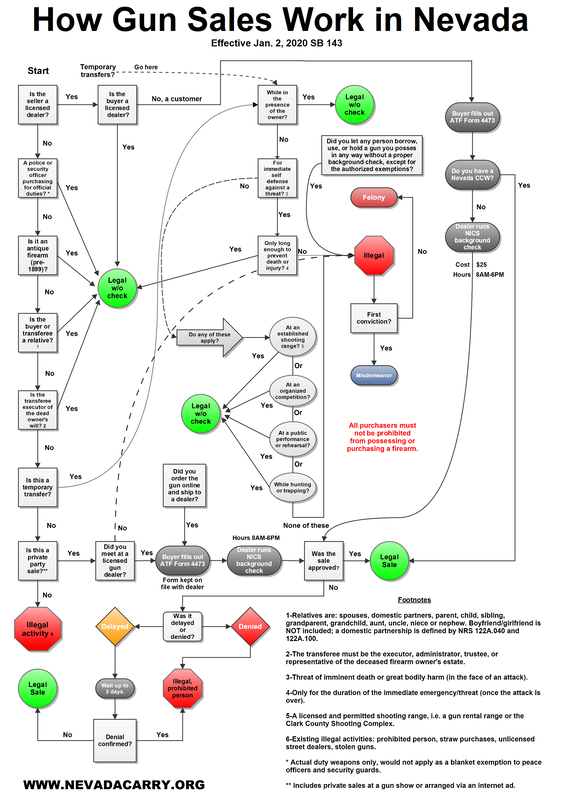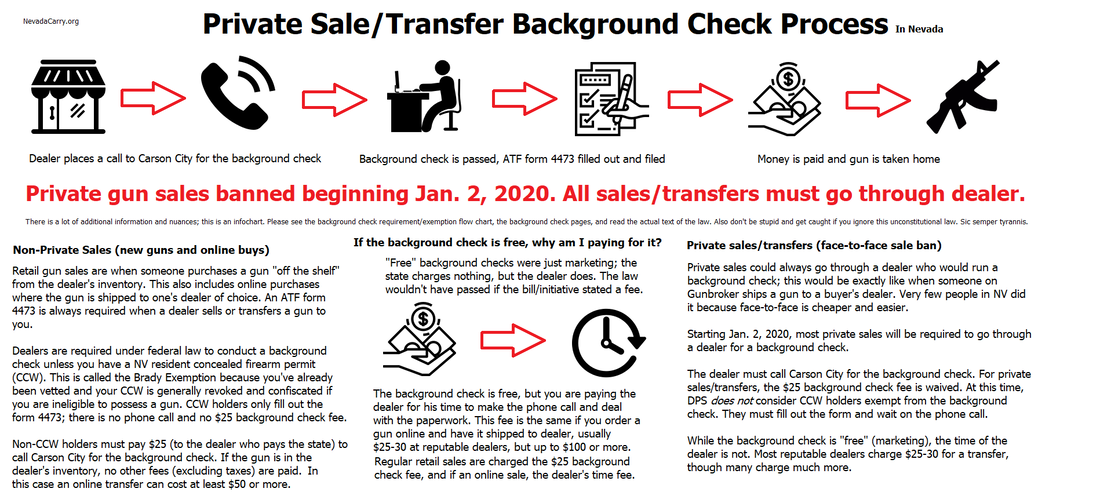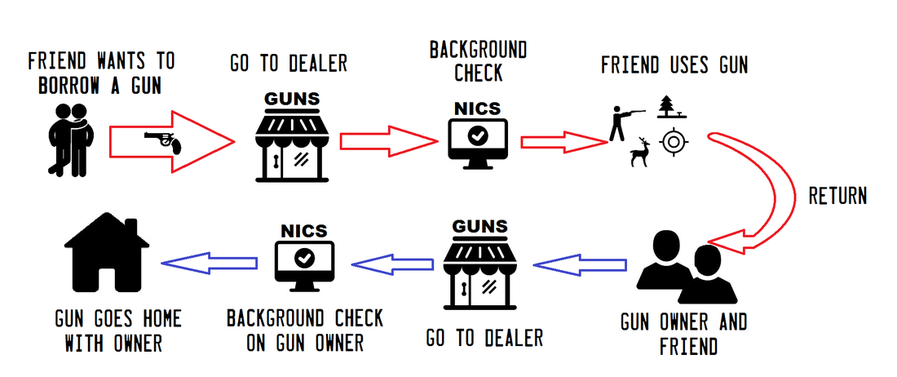|
First of all, the ban on private gun sales/transfers begins January Second, not the First. If you want to buy/sell privately on New Year's Day, go ahead. Visiting the dealer for a background check become mandatory on Thursday, January 2nd. So-called universal background checks are merely the outlawing of private gun sales and transfers that have been done since firearms were invented. Most crime guns come from sources that would not be regulated by this law. Private sale bans are intended to create a transaction record which can later be used to establish a gun registry. We know that gun registration leads to confiscation. The universal background check law was vetoed in 2013, approved by less than 1% by Clark County voters alone in 2016, and invalidated when the FBI refused to process the checks for free. SB 143 in 2019 was rammed through the Legislature and signed inside of a week, violating the constitutional requirement to wait three years from enactment (01/02/2019) before altering or amending the law. What will the universal background check laws do?It requires a private person wishes to sell a firearm to another private person, they must first appear in person at a licensed dealer who will conduct the background check through the existing federal NICS protocol. Sales can still be arranged online and at gun shows. Between the request of the background check and the actual sale/transfer of the firearm, the licensed dealer takes possession of the firearm. If the background check is delayed or denied, the owner needs a background check to get the gun back from the dealer. This creates a two-tired system for background checks at the dealer. Dealer retail sales (or receiving an online purchase shipped to the dealer)
The exemptions to the law are:
Those are the only exemptions; there are no other exemptions whatsoever. Sales/trades between CCW holders are not exempt from this law and must proceed to the dealer as above (though the Nevada Firearms Coalition is disputing this). Curio & Relic (C&R) 18 U.S.C. § 923(b) licensees are not exempt and MUST obtain a background check from a licensed dealer. If the background check is free, why am I paying for it?The background check is free, but you are paying the dealer for his time to make the phone call and deal with the paperwork. This fee is the same if you order a gun online and have it shipped to the dealer, usually $25-30 at reputable dealers, but up to $100 or more. Regular retail sales are charged the $25 background check fee, and if an online sale, the dealer's time fee. As stated above, the Brady Exemption for CCW holders currently does not apply to private sales/transfers. Non-private sales (new guns and online buys)Retail gun sales are when someone purchases a gun "off the shelf" from the dealer's inventory. This also includes online purchases where the gun is shipped to one's dealer of choice. An ATF form 4473 is always required when a dealer sells or transfers a gun to you. Dealers are required under federal law to conduct a background check unless you have a NV resident concealed firearm permit (CCW). This is called the Brady Exemption because you've already been vetted and your CCW is generally revoked and confiscated if you are ineligible to possess a gun. CCW holders only fill out the form 4473; there is no phone call and no $25 background check fee. Non-CCW holders must pay $25 (to the dealer who pays the state) to call Carson City for the background check. If the gun is in the dealer's inventory, no other fees (excluding taxes) are paid. In the case of an online transfer the total cost can be $50 or more. Private sales/transfersPrior to this law, nothing prohibited a seller from requiring a background check on a dealer. The DPS would even run a free background check via mail. Private sales/transfers could always go through a dealer who would run a background check; this would be exactly like when someone on Gunbroker ships a gun to a buyer's dealer. Very few people in Nevada did this because a face-to-face sale is cheaper and easier. Starting Jan. 2, 2020, most private sales will be required to go through a dealer for a background check (see exemptions above). The dealer must call Carson City for the background check. For private sales and transfers, the $25 background check fee is waived. At this time, DPS does not consider CCW holders exempt from the background check. They must fill out the form and wait on the phone call (NVFAC is challenging this). While the background check is "free" (this was basically a lie to get support for the law), the time of the dealer is not free. Most reputable dealers charge $25-30 for a transfer, though many charge much more. The law is practically unenforceableThe law provides no enforcement mechanism to ensure compliance with private sales background checks. The law is a feel-good measure at best that would not be enforceable, except by entrapment, sting, or confession. Nothing in it would actually prevent criminals from getting guns, just outlaw private sales, and curtail one of the many freedoms that Nevada sees fit to give its citizens. Many illegal sales will go on, and the already illicit transfers between criminals will continue as if nothing changed. Here's how not to get caught if you decide to ignore this unconstitutional, worthless law. Ignore this law at your own risk, but non-compliance with a bad law is a personal choice to make. Without someone confessing there was no background check or a sting operation, it is practically impossible to prove a violation. All you have to say is that you did obtain a background check and it’s up to the prosecution to prove you didn’t; that’s hard to do. The most important thing to remember is to remain silent and do not discuss anything with the police. Request an attorney. All you have to say is that you did get a background check in compliance with the law. Not where, when, who the gun came from, etc. (or vise versa, if you sold it). The police and prosecutor must prove their case; that's the beauty of innocent until proven guilty. Nevada currently has approximately 740 licensed FFLs. There are 365 days in a year. Remember that FFLs keep their records in their "bound book" per ATF regulations. Some may have converted to electronic bound books if issued a variance by the ATF, but this is not yet the norm. That means someone has to physically go and paw through their bound book and possibly the 4473 forms at each dealer to prove that a record does not exist. So they would have to reasonably ensure that they inspect every record at every dealer in the state. If law enforcement/prosecution do not check every dealer or check every record, they leave the door open for the defense to create a reasonable doubt that the one record at the one dealer that they did not inspect could be the form proving that the background check was completed. Remember that by federal law, the NICS system may not be used to create a registration of firearms or gun owners. This means that under federal law the identifying records on their end must be destroyed after the background check is completed. The man-hours required to attempt to prosecute a single violation of this law would be ridiculously prohibitive. How to Legally Borrow a Gun in NevadaLegally, one cannot lend a firearm to their boyfriend/girlfriend without a background check. Very close friends and non-exempt relatives must also obtain a background check. Remember, legally you have to get a background check on yourself when getting your gun back. This is highly unlikely to be enforced. How not to get caught breaking the lawFirst, don't be a scumbag or be involved with scumbags. Like most gun laws, the people arrested for breaking the laws are ones that shouldn't have a gun in the first place and doing things that tend to draw a lot of police attention. BasicsKnow who you’re dealing with. Ideally, sell between friends to avoid a sting operation. Do a little research if this person isn’t a stranger to make sure they aren’t a cop, investigative reporter, or an anti-gun activist. Does their email show their full name? Can you find a Facebook profile? Lookup their phone number. Be aware that at a gun show an undercover cop could be hovering right over your shoulder or you might be buying from one. Don’t get stung. If it’s an online ad, only discuss the gun, the price, and where to meet via email, text, or messenger. Agree to meet in a public location “to make arrangements on which licensed dealer to use.” Do not discuss online or via text message not going to a dealer. Those words could come back to haunt you. Conduct your sale in a discreet location where no one is likely to call the police because they see a gun and cash. Be smart and never actually say anything out loud that, if recorded, could be used against you in court, such as “So is it okay if we don’t go to a dealer to get a background check?” Discuss the price of the gun, show your CCW or license, but do not fill out a bill of sale or allow the other person to copy down your information. Exchange the money and gun. Make as few references to selling the gun or breaking the law as possible. One cannot beat video footage of handing off a gun in exchange for cash, but one can make an audio only recording ambiguous. The idea is to create reasonable doubt in the mind of a judge or jury. Don’t sell to someone sketchy. If they seem like a criminal or up to no good, pass on the sale. Don’t risk aiding a criminal because of a stupid law. Use your head like you’ve always done. Defenses in courtIf you are arrested, do not talk to the police. Remain silent. Demand an attorney, even if it is a public defender. Police can and will use anything you say to use against you. They cannot make you contradict yourself later in court if you don’t provide a statement to them to begin with. Never, ever talk to the police (more examples below). Keep in mind that you are innocent until proven guilty in a court of law. This means that it is the duty of the prosecution and by extension, the police, to prove that you have committed a crime. What would be the crime they would be enforcing? The crime would be failing to obtain a background check. The police have to have probable cause that you did not comply with the law in order to arrest you for failing to get a background check. Then the prosecutor has to prove beyond a reasonable doubt that you haven't completed a background check. It's difficult enough proving that you actually did do something, let alone trying to prove beyond a reasonable doubt that you did not do something. Keeping in mind that you are innocent until proven guilty; you don't have to tell them what FFL you used to get a background check. You don't have to tell them what date you transferred the firearm. You are free to exercise your Fifth Amendment right against self-incrimination—do exercise it. The entire onus of the investigation lies with law enforcement and the prosecution. Don’t start talking to the police when they begin asking questions or waive your Miranda rights. Again, it is entirely up to the prosecution to prove that you did not indeed go to a dealer. You don’t have to “help” them by telling them anything. The more you talk, the tighter the net your words will weave to trip you up. You can’t explain anything away or throw them off the trail. Comments are closed.
|
Archives
June 2024
CategoriesBlog roll
Clayton E. Cramer Gun Watch Gun Free Zone The War on Guns Commander Zero The View From Out West |



 RSS Feed
RSS Feed